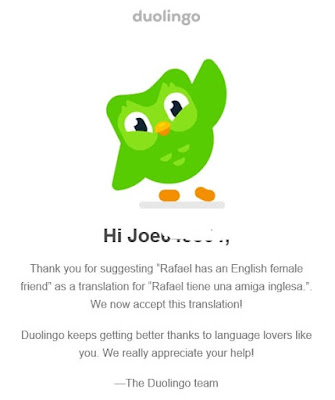 |
| Almost got it in 2. Almost... |
Every day, I post a note like this on my main Meta channel, Facebook: “Got it in 5 today, tough day” or “In 3, not bad.”
Usually, I include the colorful grid that charts letters correct and wrong.
A sister at one point asked what the cryptic notes (that day, no grid) were about, but those in the cult already know. It’s Wordle, an online sensation that netted a software engineer (named Josh Wardle) more than $1 million. The New York Times purchased the app, and didn’t disclose for how much, except it was “low seven figures.”
Well, nice. The game has exploded in recent weeks, for lots of reasons. It’s a word game that tickles the brain, but doesn’t tire it too much. I don’t want to jinx myself, but in several weeks of daily play, I’ve not yet failed to solve the Wordle (although I have sometimes only solved it on the sixth try). I wouldn’t call it super easy, but it’s not a horribly challenging game.
And Mr. Wardle made an incredibly smart move. When you solve the Wordle, it makes the results easily shareable on social media, via phone app or via computer, with an easily recognizable graphical scheme that shows your results and doesn’t spoil it for other players. That graphic, by the way, is the one controversial aspect of the game, as apparently people who use Twitter to share their results kind of mess up visually impaired Twitter users who have the program read tweets—it takes a while, or so I’ve read, for the Twitter robot to read “green square, green square, yellow square, grey square,” etc.
I’m sure the tech minions at the Times will figure that one out soon. When the Times purchased the game it causes some anxiety because it’s been available for free—and does one need a Times subscription in the future to access it? That remains to be seen. But for now, Wordle is an example of something going suddenly hot, for what I think are the right reasons. It’s pleasant, not too taxing, and easily shareable on social media.
It reminds me, a little, of Duolingo, a language app I’ve been using for some time. I am active in three languages: I take Duolingo lessons in Chinese, Hungarian and Spanish.
Based on my experience, having some experience with a language before doing Duo makes a huge difference—I move through Spanish lessons much more quickly. Of course, Spanish is an easier language for a native English speaker to learn in the first place—Hungarian is a bit quirky, and Chinese might as well come from the other side of the globe. Which it does.
I don’t aspire to be fluent in Hungarian or Chinese, but am dabbling with those languages for various reasons. I have family connections to both, for one. And, while Chinese is very challenging, I just like the different sound and writing system it has for their being so different.
Hungarian lessons are slightly goofy fun because of the sentences Duolingo uses. It’s a language course that seems partly stuck in World War II. I’m hoping I don’t have to say “The German soldiers are outside the train station” in Hungarian all that often, but just in case, that kind of sentence has been in lessons. The Hungarian course also has some weird, eyebrow-raising statements like: “The Hungarian actresses and thin and pretty while the English ones are short and slow.” That’s not literal, don’t come at me Duo, I’m pretty sure that particular sentence has not been in any lesson, but sentences like it do appear. Not usually in that horrible form I wrote as an example, but more like: “The Hungarian cars and new and fast” (sentence one) “The German cars are slow and old” (sentence two).
Be a little more polite, Duo. After all, there’s a lot of German soldiers over by that train station.
Anyway, in an age of disinformation, I do take a minor amount of comfort that the internet also brings us some pleasant diversions that may be good for our brains.
Like Wordle. Like easily accessible language lessons. Cyberspace that be a hostile part of the world, but it still has its pleasant neighborhoods.

No comments:
Post a Comment